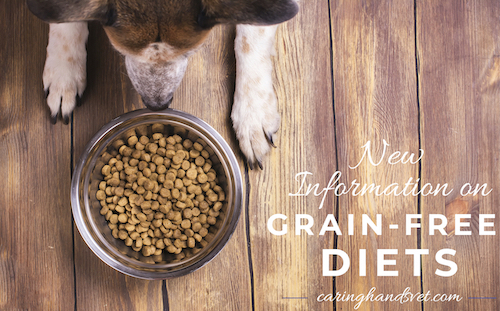
In this ever-evolving world of human and animal medicine, we are constantly trying to improve health and wellbeing for ourselves and our pets. In the early 1990s, a thought that grain and more often corn or gluten were causing intestinal allergies and possible behavior issues in people began to emerge. There was a push to eliminate gluten from our diets. In the early 2000’s we expanded this thought to our pets as well. The grain-free diet was introduced. It was meant to help a dog’s skin and intestinal health with an added benefit of better behavior.
Over 70% of dog foods in America are now grain-free. Unfortunately, the money to be made in the pet food market has had more companies enter the market without much oversight to make sure standards are met. Also, the science that is necessary to make sure these changes are safe is delayed. We are now finally seeing research come out.
We understand that there are some essential nutrients missing from dogs’ diets that are necessary to maintain a healthy heart muscle. About two years ago, a trend was noticed by Veterinary Cardiologists. They were seeing a new form of Dilated Cardiomyopathy in dogs and breeds that were not commonly associated with this problem. They started to look at cases retrospectively and found a link to grain-free diets. In the past year, there has been more extensive research being done to try and identify which nutrients are missing and what we can do to help.
Meet Bailey
 Bailey is a very handsome 8-year-old Sheltie. In his early years, he was plagued with skin issues that even scratched the head of dermatologists in the area. He was started on a grain-free diet to see if it would improve. He did improve but we noticed it was reoccurring seasonally even though he was on the new diet all year long. We kept him on the diet as he liked it and was doing well otherwise. This past year Bailey started coughing. We took radiographs and noticed his heart was a little enlarged, but no sign of any malfunction and his lungs looked healthy. We started treating him for possible allergic asthma. He did improve initially but the cough kept coming back and on a recheck exam, we noticed he had a new heart murmur. We repeated the radiographs and his heart measurements were getting larger.
Bailey is a very handsome 8-year-old Sheltie. In his early years, he was plagued with skin issues that even scratched the head of dermatologists in the area. He was started on a grain-free diet to see if it would improve. He did improve but we noticed it was reoccurring seasonally even though he was on the new diet all year long. We kept him on the diet as he liked it and was doing well otherwise. This past year Bailey started coughing. We took radiographs and noticed his heart was a little enlarged, but no sign of any malfunction and his lungs looked healthy. We started treating him for possible allergic asthma. He did improve initially but the cough kept coming back and on a recheck exam, we noticed he had a new heart murmur. We repeated the radiographs and his heart measurements were getting larger.
Bailey went to see the cardiologist to rule out heart disease as an underlying cause of his cough. Both Bailey’s owners and I were shocked to learn that the cardiologist feels the diet Bailey has been on has caused his heart muscle to weaken and his heart to become dilated. He was immediately started on heart medications and supplements to support his heart function. He started on a slow transition to a non-grain-free diet. Bailey is improving and his cough is getting better on the new medications. He has transitioned to a non-grain-free diet and is doing well with his skin and has even lost a bit of weight! We hope to see his heart changes improve over time, but his cardiologist is not sure the heart disease is reversible yet.
Our Recommendation
As veterinarians, we want to make the best recommendations based on the science and research we have available. At this time, we need to be more proactive in trying to find the actual nutrients that are missing. There is research going into this very important topic. What we do know, is that the retrospective studies did not show these changes in dogs that were fed diets that contained more commonly used grains. The grain-free diets that have tried to replace grains with legumes have been connected but other diets that just eliminate grains are also problematic.
If your dog needs a grain-free diet for medical reasons, please discuss this with your veterinarian. There are prescription diets available that are supplementing the nutrients that we suspect are missing. If they do not need these types of diets for medical reasons, we are encouraging owners to transition to grained diets in hopes of avoiding the development of this life-threatening condition.



